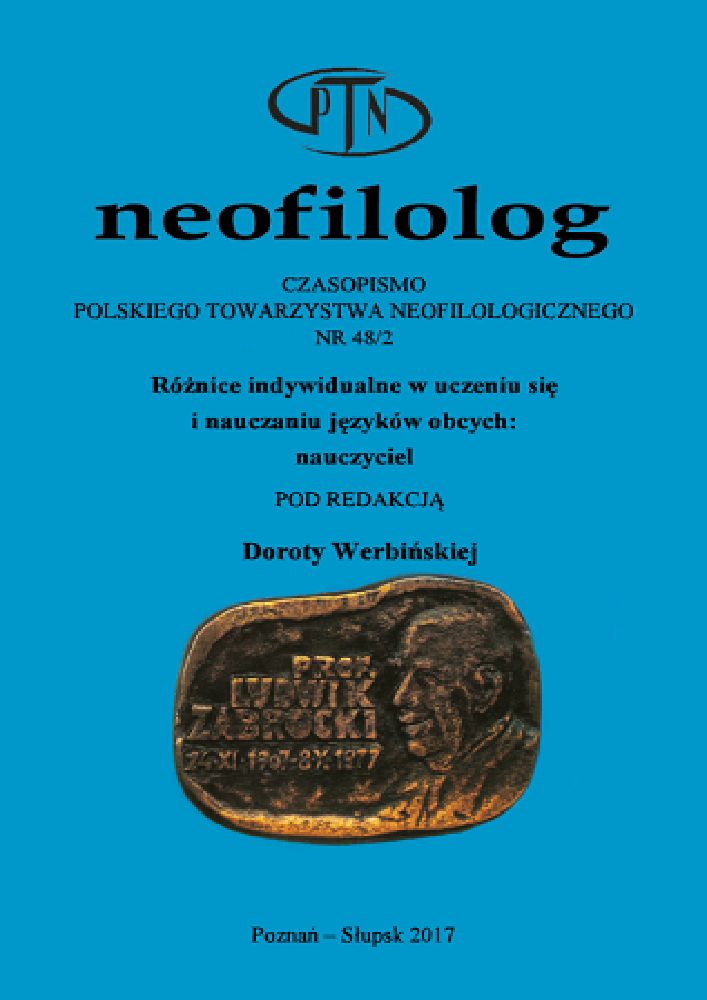Résumé
The article concerns pre-service English language teacher training and discusses some results of an on-going action research project, the aim of which is to investigate a way of supporting student reflection while they do obligatory teaching practice in Polish state schools. The paper presents the design of the “Develop by Blogging” intervention, as well as its pilot implementation. Preliminary findings suggest that the intervention has the potential to create time and space for reflection on individual professional experience and can constitute a chance for enhancing reflection among pre-service teachers.
Références
Brown, A. H. i T. D. Green. 2016. The essentials of instructional design: Connecting fundamental principles with process and practice. New York: Routledge.
Cherry, N. 2002. Action Research: a pathway to action, knowledge and learning. Melbourne: RMIT University Press.
Conole, G. 2012. Designing for learning in an open world. Dordrecht: Springer.
Creswell, J. W. 2013. Projektowanie badań naukowych. Metody jakościowe, ilościowe i mieszane. Kraków: Wydawnictwo Uniwersytetu Jagiellońskiego.
Czura, A. 2014. „Wprowadzenie”. Neofilolog, 43(1): 5-6.
Farrell, T. S. 2007. Reflective language teaching: From research to practice. London: Continuum.
Fisher, L. i D. Kim 2013. „Two approaches to the use of blogs in pre-service foreign language teachers’ professional development: a comparative study in the context of two universities in the UK and the US”. The Language Learning Journal, 41(2): 142-160.
Gabryś-Barker, D. 2012. Reflectivity Pre-service Teacher Education: A Survey of Theory and Practice. Katowice: Wydawnictwo Uniwersytetu Śląskiego.
Garza, R. i S. F. Smith. 2015. „Pre-service teachers’ blog reflections: Illuminating their growth and development”. Cogent Education, 2: 1066550. http://www.tandfonline.com/doi/full/10.1080/2331186X.2015.1066550 DW 09.07.2017.
Gay, L. R., Mills, G. E. i P. W. Airasian. 2011. Educational research: Competencies for analysis and applications. Upper Saddle River: Pearson Education.
Górecka, J. i A. Nowicka 2015. „Uczenie się w interakcjach argumentacyjnych a tożsamość ucznia jako rozmówcy”. Lingwistyka Stosowana, 14: 41-55.
Jodłowiec, M. 2005. „Developing a Reflective Practitioner: A Teacher Educator’s Perspective”. (w) Studies in Teacher Education: Language, Literature, and Culture. (red. M. Misztal i M. Trawiński). Kraków: Wydawnictwo Naukowe Akademii Pedagogicznej, str. 9-16.
Killeavy, M. i A. Moloney. 2010. „Reflection in a social space: Can blogging support reflective practice for beginning teachers?”. Teaching and Teacher Education, 26(4): 1070-1076.
Kolb, D. 1984. Experiential Learning. Englewood Cliffs, New York: Prentice Hall.
Komorowska, H. 2015. „Rozwój glottodydaktyki a kształcenie nauczycieli języków obcych”. Postscriptum Polonistyczne, 2(16): 11-29.
Luik, P., Voltri, O., Taimalu, M. i K. Kalk. 2011. „On the use of student teacher blogs during teaching practice”. Procedia-Social and Behavioral Sciences, 11: 165-169.
Mor, Y. i B. Craft. 2012. „Learning design: reflections upon the current landscape”. Research in learning technology, 20 (sup1): 19196.
Mor, Y. i O. Mogilevsky. 2013. „The learning design studio: collaborative design inquiry as teachers’ professional development”. Research in Learning Technology, 21(1): 22054.
Schön, D. A. 1983. The reflective practitioner. How professionals think in action. New York: Basic Books.
Stiler, G. M. i T. Philleo. 2003. „Blogging and blogspots: An alternative format for encouraging reflective practice among preservice teachers”. Education, 123(4): 789-797.
Yang, S. H. 2009. „Using blogs to enhance critical reflection and community of practice”. Educational Technology & Society, 12(2): 11-21.
Wilczyńska, W. i A. Michońska-Stadnik. 2010. Metodologia badań w glottodydaktyce: Wprowadzenie. Kraków: Avalon.
Wygotsky, L. S. 1971. Wybrane prace psychologiczne. Warszawa: Państwowe Wydawnictwo Naukowe.
Zawadzka-Bartnik, E. 2014. „Refleksja w zawodzie nauczyciela – założenia a realne możliwości realizacji”. Neofilolog, 43(1): 7-23.
Netografia
http://developbyblogging.weebly.com DW 09.07.2017
https://elsbetha.wordpress.com/2016/03/02/the-solution/#comments DW 09.07.2017
https://pollytheteacher.wordpress.com DW 09.07.2017
http://sjp.pwn.pl/sjp/refleksja;2573649.html DW 09.07.2017
https://wordpress.com DW 09.07.2017
http://www.edmodo.com DW 09.07.2017
http://www.tesol.org DW 09.07.2017
Licence
© Joanna Pitura 2017

Ce travail est disponible sous licence Creative Commons Attribution - Pas de Modification 4.0 International.
Auteurs :
Les auteurs de textes acceptés pour publication dans la revue Neofilolog sont tenus de remplir, signer et renvoyer à l'adresse de la rédaction, un accord sur l'octroi d'une licence gratuite pour les œuvres, avec obligation d'accorder une sous-licence CC.
En vertu de cet accord, les auteurs des textes publiés dans la revue Neofilolog accordent à l'Université Adam Mickiewicz de Poznań une licence non exclusive et gratuite et permettent l'utilisation de la sous-licence Creative Commons Attribution-NoDerivatives 4.0 International (CC BY-ND 4.0).
Les auteurs se réservent le droit de disposer librement de l'œuvre.
Utilisateurs :
Les utilisateurs d'Internet intéressés ont le droit d'utiliser les œuvres publiées à partir de l'année 2017 sous réserve des conditions suivantes :
- reconnaissance de la qualité d'auteur - l'obligation de fournir des informations sur la qualité d'auteur, le titre, la source (liens vers l'œuvre originale, DOI) et la licence, ainsi que l'œuvre distribuée ;
- sans créer d'œuvres dérivées - l'œuvre doit être conservée dans sa forme originale, p. ex. les traductions ou les interprétations ne peuvent être distribuées sans le consentement de l'auteur.
Tous les textes publiés sont soumis au droit d'auteur.
Autres :
L'Université Adam Mickiewicz de Poznań se réserve le droit à la revue dans son ensemble (mise en page, forme graphique, titre, conception de la couverture, logo, etc.).
.
